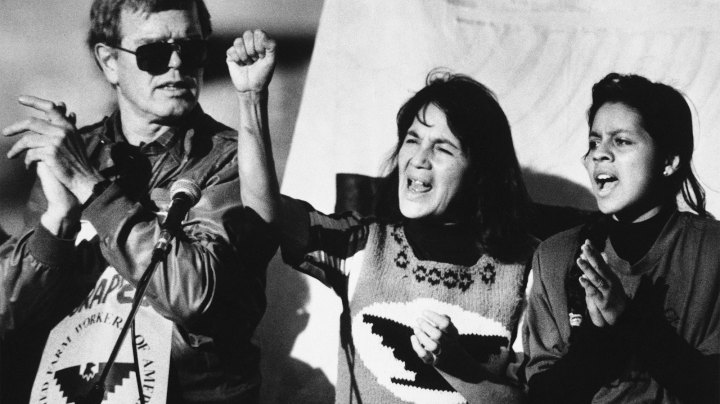A Look Back at Dolores Huerta’s Tireless Activism Through Film

Dolores Huerta. Photo: Court Mast/AP
So California’s about to dry up. That’s big news. But while folks outside the Golden State might be fretting about the price of almonds, the crude reality of this impending ecological disaster is that a whole way of life is in danger. No, it’s not the surfer dudes of the Central Coast. We’re talking about the long-established Latino farming communities of California’s Central Valley, where for decades farmworkers struggled against the exploitative practices of agricultural conglomerates, ultimately giving rise to the United Farm Workers Organizing Committee (UFW) and the West Coast’s own version of the civil rights movement.
What you may not know is that this year marked the 85th year of life for Chicana warrior queen Dolores Huerta, who founded the UFW along with César Chávez and made the Central Valley a symbol for modern organized labor and Latino self-empowerment. So in honor of Ms. Huerta’s six decades of tireless struggle, let’s take a look back at the life and cinematic legacy of one of the United States’ most enduring activist icons.

Born in 1930 in the northern New Mexico mining town of Dawson (now a ghost town consisting of a handful of abandoned buildings), Huerta moved with her mother to the inland agricultural city of Stockton, California after her parents divorced in 1933. Inspired by her mother’s own labor organizing efforts, Huerta opened a local chapter of the Community Service Organization as a teenager before going on to study at Stockton College and finding work as a teacher. Nevertheless, the wrenching poverty she encountered every day in the classroom reinforced her activist inclinations, and before long, she teamed up with Chávez to found the National Farmworkers Association – the organization that would eventually become the UFW.
Along with Chávez and Larry Itliong, Huerta led Filipino and Mexican-American grape pickers on the five-year Delano Grape Strike that earned national attention and public sympathy from the likes of then-senator Robert Kennedy, before leading to an historic collective bargaining agreement between the UFW and the California table grape industry. Over the ensuing decades, Huerta endured constant arrests for her organizing and nonviolent protest tactics, even surviving a brutal beating at the hands of the San Francisco Police in 1988 that required emergency surgery and left her with several broken ribs.

Naturally, her efforts have been recognized far and wide, and she has been the recipient of a number of awards and recognitions throughout her career. From honorary degrees and numerous Most Important American Women lists to the Presidential Medal of Freedom, Huerta’s indefatigable labors have placed her firmly in the pantheon of 20th-century American heroes. Then, of course, there are the movies. Since debuting on the big screen in 1997’s César Chávez bio-documentary, The Fight in the Fields, Huerta has amassed an impressive filmography as a go-to talking head for explorations of labor issues or Chicano civil rights in the media. While her lifelong collaborator César Chávez might be the marquee name, Huerta’s constant, self-effacing work has nevertheless left an indelible imprint on the American consciousness.
Here’s a roundup of films featuring real talk from La Madrina del Movimiento.
The Fight in the Fields
Director: Rick Tejada-Flores, Ray Telles
Year: 1997
A Crushing Love
Director: Sylvia Morales
Year: 2009
Food Chains
Director: Sanjay Rawal
Year: 2014
Then of course, there was that one time when activist Rosario Dawson played Huerta in a movie directed by Diego Luna.
Cesar Chavez
Director: Diego Luna
Year: 2014